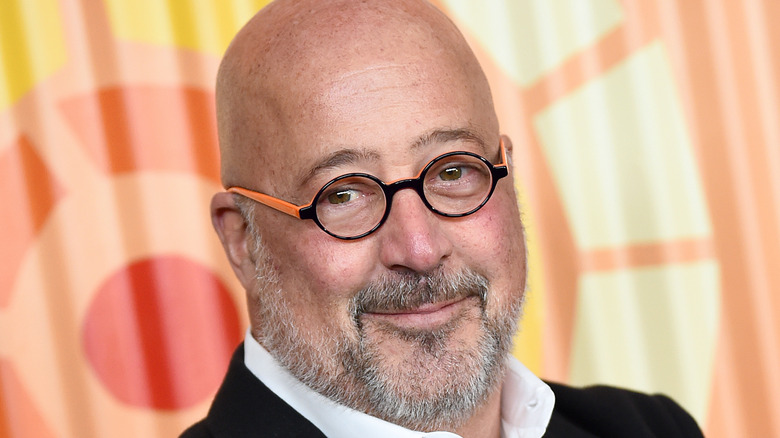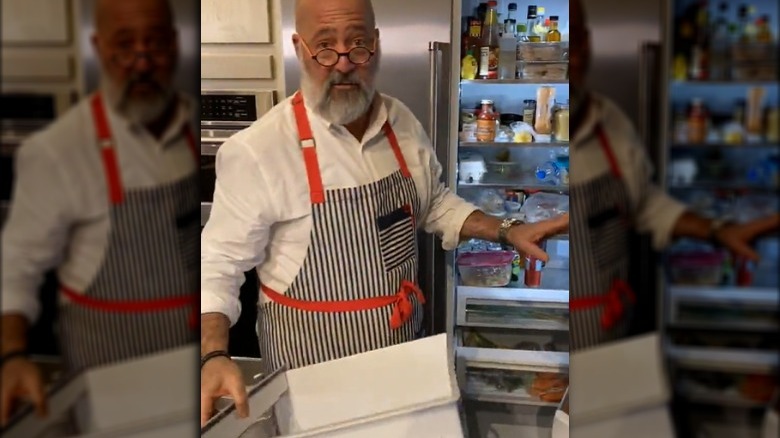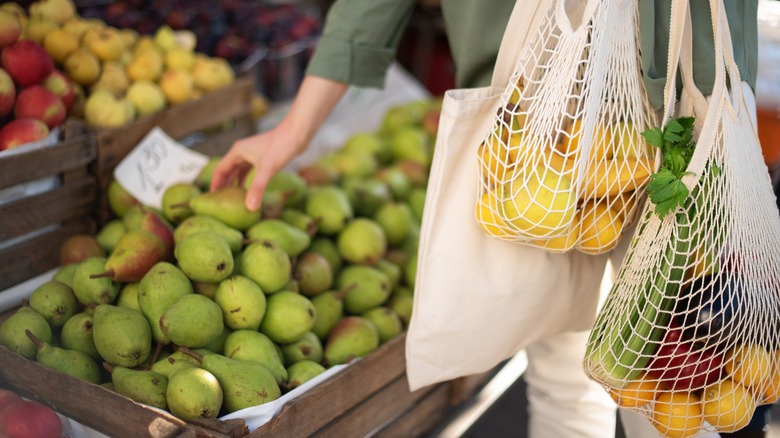Andrew Zimmern Just Shared 7 Easy Ways To Reduce Food Waste
In celebration of International Stop Food Waste Awareness Day on April 28, Andrew Zimmern took to IGTV to give viewers some great tips on how everyone can reduce food waste. He teamed up with partners Aldi USA and Feeding America, to work on reducing food waste globally. As he put it during his live video, "Food waste is a climate crisis issue, first and foremost. I mean full stop. Let's just get that out of the way."
As Move for Hunger reports, we only consume approximately 2/3 of the food produced worldwide — the rest is wasted. It's even worse in the States. "Forty percent of food in America, much of it pre-consumer contact, but much of it after, is wasted," said Zimmern. Move for Hunger refers to the different types of wastage as upstream — when it's being produced — and downstream, when it's ready for consumers.
The site notes that the farther downstream the wastage happens, the greater the environmental impact as it has taken more energy to process and distribute it, not to mention the water used in growing the food, whether it be plant- or animal-based. And food decomposition in landfills releases methane, which contributes to global warming as much, if not more than carbon dioxide, according to Move for Hunger. As Zimmern noted, decreasing food waste means, "less that needs to be grown, putting less pressure on the land and the rest of our food systems. Fewer trucks, fewer deliveries. Do you see where I'm going with this? Our carbon footprint comes down when we're wasting less food."
Zimmern's tips give simple ways to decrease our personal food waste
The primary way you can make a difference, Zimmern recommended, is by supporting businesses that are making an effort to reduce food waste. "The number one way that you can knock back food waste is to vote with your wallet and with your feet ... That means supporting businesses that have the best net impact on our environment," he stated in his IGTV video. That includes companies (like Aldi) that are actively working to reduce the food waste at their stores, to businesses selling reusable products like metal straws and shopping bags. Zimmern also suggested that viewers switch to beeswax wraps and use glass food storage containers instead of plastic options. Swapping to reusable products versus single-use, he said, not only helps the environment but can often help items last longer.
Next, he suggested taking out drawers or shelves from your fridge so it holds less food. Zimmern explained that 40% of the waste in his own home happens when he buys too much. To prevent that, he also recommended building meal plans for three to four days and connecting that to a shopping list. If you don't have room to store excess food, and you have a plan for meals, you won't have disused food rotting in your fridge.
There are more ways to easily make a positive impact
Other small tricks include writing the date when you bought something on items like yogurt and spices so you know how long the container has been open. Zimmern also recommends trying to eat more sustainable foods and reducing your personal meat intake. "Sustainable eating is the primary solution to fighting food waste," he stated during the IGTV talk.
Another big one he recommended is keeping track of everything you throw away to see if there are items you regularly waste that you could purchase less of or make a concerted effort to use. "When you have a pad in your kitchen counter that tells you, 'I throw away X number of items a week,' ... then you know what to focus on," he said
Zimmern added a few bonus tips, too, like keeping vegetable scraps such as onion skins in a freezer bag, and then making vegetable stock from them when they're full. For fresh herbs that spoil quickly, he suggested making a fresh cut, like you would with fresh flowers, and placing them in a jar with an inch of water, covered in a reusable bag or the bag it came in to keep the moisture in and keep the herbs fresh longer.
These small things can make a big difference. Cutting food waste, he explained, "keeps our planet healthier and it reduces our need to rely on factory farms and processed foods, which helps keep our waterways and our land cleaner. It is a massive win for America."


